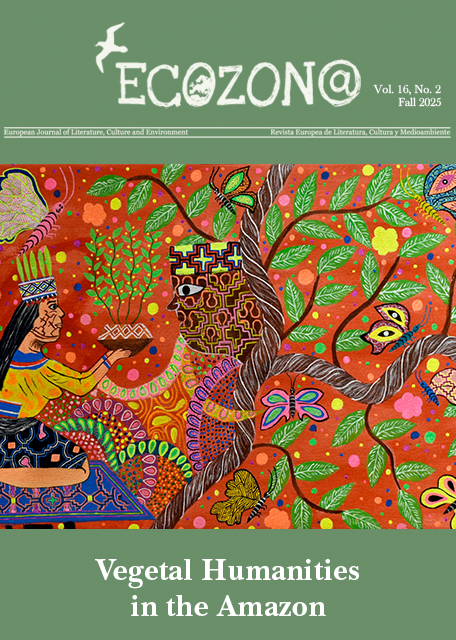Armadillos, hippopotamuses and biopolitcs in "The Sound of Things Falling" by Juan Gabriel Vásquez
DOI:
https://doi.org/10.37536/ECOZONA.2025.16.1.5180Schlagworte:
human/animal literary studies, The Sound of Things Falling, Juan Gabriel Vásquez, biopoliticsAbstract
The Sound of Things Falling (2011), a novel by Colombian author Juan Gabriel Vásquez, explores the relationship between humans and animals within a society traumatized by violence. In this article I briefly discuss human/animal studies in literature; I then outline Giorgio Agamben’s theory of biopolitics in the context of human/animal studies. Utilizing Agamben’s framework, I offer a biopolitical reading of The Sound of Things Falling. I explore how biopolitics illuminates the life of a pet armadillo which appears in the novel, an animal which scholars have ignored in literary criticism. I argue that the armadillo’s life reveals the biopolitical system which upholds specious boundaries separating humans and animals. I examine how the armadillo exposes the categories of sovereign power functioning in the novel, particularly as they relate to drug trafficking. I also offer an analysis of the hippopotamuses within the novel, a topic which scholars have discussed at length. I contend that literary criticism has overlooked the character of Ricardo Laverde with respect to his relationship to the hippos. I develop a reading which highlights the connections between Laverde and the hippos, not to interpret the animals merely through an anthropocentric lens as a metaphor for Laverde, but to show the interweaving of their stories as warnings against the violence in biopolitical formations. Through these readings I demonstrate that Vázquez employs animals in the novel to emphasize the vulnerability of all bodies within the biopolitical structures and institutions in Colombian society.
Downloads
Downloads
Veröffentlicht
Ausgabe
Rubrik
Lizenz
Authors who publish with this journal agree to the following terms:
a) Authors retain copyright and grant the journal right of first publication with the work simultaneously licensed under a Creative Commons Attribution License that allows others to share the work with an acknowledgement of the work's authorship and initial publication in this journal (CC BY-NC for articles and CC BY-NC-ND for creative work, unless author requests otherwise.
b) Authors are able to enter into separate, additional contractual arrangements for the non-exclusive distribution of the journal's published version of the work (e.g., post it to an institutional repository or publish it in a book), with an acknowledgement of its initial publication in this journal.
c) Authors are permitted and encouraged to post their work online (e.g., in institutional repositories or on their website) prior to and during the submission process, as it can lead to productive exchanges, as well as earlier and greater citation of published work (See The Effect of Open Access).










